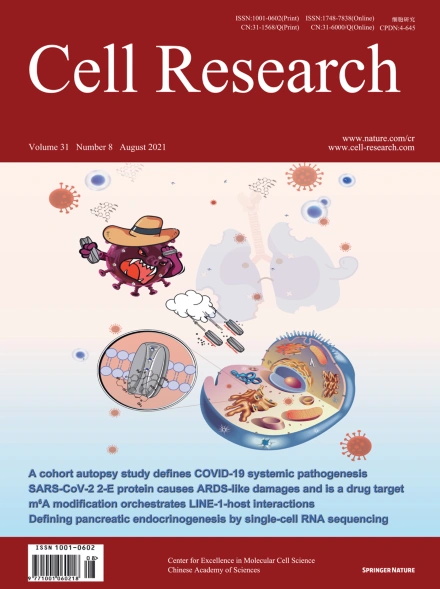
Advanced Search
Submit Manuscript
Advanced Search
Submit Manuscript
Volume 31, No 8, Aug 2021
ISSN: 1001-0602
EISSN: 1748-7838 2018
impact factor 17.848*
(Clarivate Analytics, 2019)
Volume 31 Issue 8, August 2021: 919-928
Association of assisted reproductive technology, germline de novo mutations and congenital heart defects in a prospective birth cohort study
Cheng Wang1,2,3 , Hong Lv1,2,4 , Xiufeng Ling1,5 , Hong L1,6 , Feiyang Diao1,7 , Juncheng Dai11,2 , Jiangbo Du1,2 , Ting Chen8 , Qi Xi9 , Yang Zhao1,2 , Kun Zhou1,2 , Bo Xu1,2 , Xiumei Han1,2 , Xiaoyu Liu1,2 , Meijuan Peng1,2 , Congcong Chen1,2 , Shiyao Tao1,2 , Lei Huang1,2 , Cong Liu1,2 , Mingyang Wen1,2 , Yangqian Jiang1,2 , Tao Jiang1,2 , Chuncheng Lu1,10 , Wei Wu1,10 , Di Wu1,10 , Minjian Chen1,10 , Yuan Lin1,4,11 , Xuejiang Guo1 , Ran Huo1 , Jiayin Liu1,4,7 , Hongxia Ma1,2 , Guangfu Jin1,2 , Yankai Xia1,10 , Jiahao Sha1 , Hongbing Shen1,2,4,* , Zhibin Hu1,2,4,*
1State Key Laboratory of Reproductive Medicine, Nanjing Medical University, Nanjing, Jiangsu, ChinaEmerging evidence suggests that children conceived through assisted reproductive technology (ART) have a higher risk of congenital heart defects (CHDs) even when there is no family history. De novo mutation (DNM) is a well-known cause of sporadic congenital diseases; however, whether ART procedures increase the number of germline DNM (gDNM) has not yet been well studied. Here, we performed whole-genome sequencing of 1137 individuals from 160 families conceived through ART and 205 families conceived spontaneously. Children conceived via ART carried 4.59 more gDNMs than children conceived spontaneously, including 3.32 paternal and 1.26 maternal DNMs, after correcting for parental age at conception, cigarette smoking, alcohol drinking, and exercise behaviors. Paternal DNMs in offspring conceived via ART are characterized by C>T substitutions at CpG sites, which potentially affect protein-coding genes and are significantly associated with the increased risk of CHD. In addition, the accumulation of non-coding functional mutations was independently associated with CHD and 87.9% of the mutations were originated from the father. Among ART offspring, infertility of the father was associated with elevated paternal DNMs; usage of both recombinant and urinary follicle-stimulating hormone and high-dosage human chorionic gonadotropin trigger was associated with an increase of maternal DNMs. In sum, the increased gDNMs in offspring conceived by ART were primarily originated from fathers, indicating that ART itself may not be a major reason for the accumulation of gDNMs. Our findings emphasize the importance of evaluating the germline status of the fathers in families with the use of ART.
https://doi.org/10.1038/s41422-021-00521-w